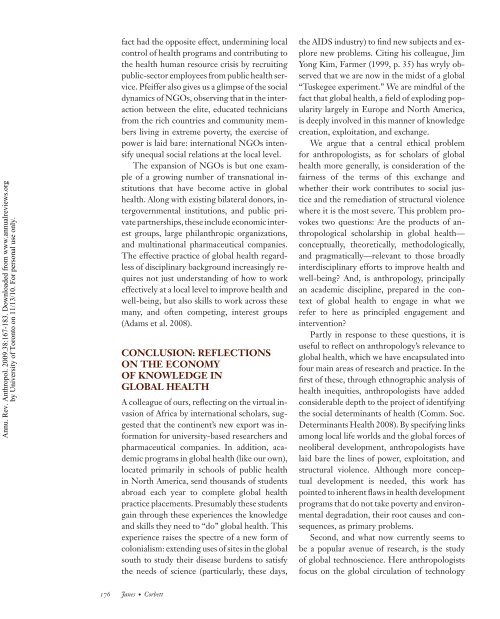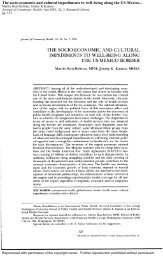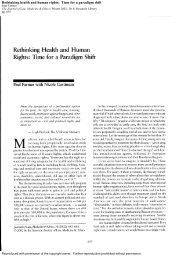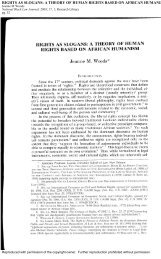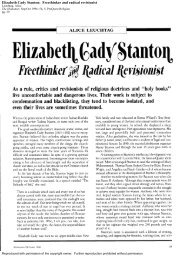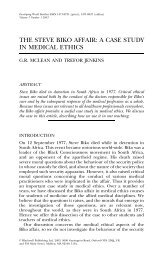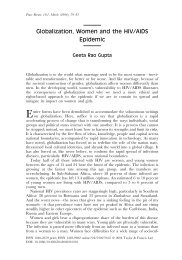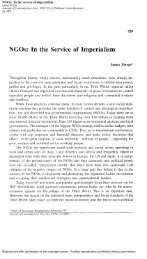Anthropology and Global Health - Human Biology - University of ...
Anthropology and Global Health - Human Biology - University of ...
Anthropology and Global Health - Human Biology - University of ...
You also want an ePaper? Increase the reach of your titles
YUMPU automatically turns print PDFs into web optimized ePapers that Google loves.
Annu. Rev. Anthropol. 2009.38:167-183. Downloaded from www.annualreviews.org<br />
by <strong>University</strong> <strong>of</strong> Toronto on 11/13/10. For personal use only.<br />
fact had the opposite effect, undermining local<br />
control <strong>of</strong> health programs <strong>and</strong> contributing to<br />
the health human resource crisis by recruiting<br />
public-sector employees from public health service.<br />
Pfeiffer also gives us a glimpse <strong>of</strong> the social<br />
dynamics <strong>of</strong> NGOs, observing that in the interaction<br />
between the elite, educated technicians<br />
from the rich countries <strong>and</strong> community members<br />
living in extreme poverty, the exercise <strong>of</strong><br />
power is laid bare: international NGOs intensify<br />
unequal social relations at the local level.<br />
The expansion <strong>of</strong> NGOs is but one example<br />
<strong>of</strong> a growing number <strong>of</strong> transnational institutions<br />
that have become active in global<br />
health. Along with existing bilateral donors, intergovernmental<br />
institutions, <strong>and</strong> public private<br />
partnerships, these include economic interest<br />
groups, large philanthropic organizations,<br />
<strong>and</strong> multinational pharmaceutical companies.<br />
The effective practice <strong>of</strong> global health regardless<br />
<strong>of</strong> disciplinary background increasingly requires<br />
not just underst<strong>and</strong>ing <strong>of</strong> how to work<br />
effectively at a local level to improve health <strong>and</strong><br />
well-being, but also skills to work across these<br />
many, <strong>and</strong> <strong>of</strong>ten competing, interest groups<br />
(Adams et al. 2008).<br />
CONCLUSION: REFLECTIONS<br />
ON THE ECONOMY<br />
OF KNOWLEDGE IN<br />
GLOBAL HEALTH<br />
A colleague <strong>of</strong> ours, reflecting on the virtual invasion<br />
<strong>of</strong> Africa by international scholars, suggested<br />
that the continent’s new export was information<br />
for university-based researchers <strong>and</strong><br />
pharmaceutical companies. In addition, academic<br />
programs in global health (like our own),<br />
located primarily in schools <strong>of</strong> public health<br />
in North America, send thous<strong>and</strong>s <strong>of</strong> students<br />
abroad each year to complete global health<br />
practice placements. Presumably these students<br />
gain through these experiences the knowledge<br />
<strong>and</strong> skills they need to “do” global health. This<br />
experience raises the spectre <strong>of</strong> a new form <strong>of</strong><br />
colonialism: extending uses <strong>of</strong> sites in the global<br />
south to study their disease burdens to satisfy<br />
the needs <strong>of</strong> science (particularly, these days,<br />
the AIDS industry) to find new subjects <strong>and</strong> explore<br />
new problems. Citing his colleague, Jim<br />
Yong Kim, Farmer (1999, p. 35) has wryly observed<br />
that we are now in the midst <strong>of</strong> a global<br />
“Tuskegee experiment.” We are mindful <strong>of</strong> the<br />
fact that global health, a field <strong>of</strong> exploding popularity<br />
largely in Europe <strong>and</strong> North America,<br />
is deeply involved in this manner <strong>of</strong> knowledge<br />
creation, exploitation, <strong>and</strong> exchange.<br />
We argue that a central ethical problem<br />
for anthropologists, as for scholars <strong>of</strong> global<br />
health more generally, is consideration <strong>of</strong> the<br />
fairness <strong>of</strong> the terms <strong>of</strong> this exchange <strong>and</strong><br />
whether their work contributes to social justice<br />
<strong>and</strong> the remediation <strong>of</strong> structural violence<br />
where it is the most severe. This problem provokes<br />
two questions: Are the products <strong>of</strong> anthropological<br />
scholarship in global health—<br />
conceptually, theoretically, methodologically,<br />
<strong>and</strong> pragmatically—relevant to those broadly<br />
interdisciplinary efforts to improve health <strong>and</strong><br />
well-being? And, is anthropology, principally<br />
an academic discipline, prepared in the context<br />
<strong>of</strong> global health to engage in what we<br />
refer to here as principled engagement <strong>and</strong><br />
intervention?<br />
Partly in response to these questions, it is<br />
useful to reflect on anthropology’s relevance to<br />
global health, which we have encapsulated into<br />
four main areas <strong>of</strong> research <strong>and</strong> practice. In the<br />
first <strong>of</strong> these, through ethnographic analysis <strong>of</strong><br />
health inequities, anthropologists have added<br />
considerable depth to the project <strong>of</strong> identifying<br />
the social determinants <strong>of</strong> health (Comm. Soc.<br />
Determinants <strong>Health</strong> 2008). By specifying links<br />
among local life worlds <strong>and</strong> the global forces <strong>of</strong><br />
neoliberal development, anthropologists have<br />
laid bare the lines <strong>of</strong> power, exploitation, <strong>and</strong><br />
structural violence. Although more conceptual<br />
development is needed, this work has<br />
pointed to inherent flaws in health development<br />
programs that do not take poverty <strong>and</strong> environmental<br />
degradation, their root causes <strong>and</strong> consequences,<br />
as primary problems.<br />
Second, <strong>and</strong> what now currently seems to<br />
be a popular avenue <strong>of</strong> research, is the study<br />
<strong>of</strong> global technoscience. Here anthropologists<br />
focus on the global circulation <strong>of</strong> technology<br />
176 Janes·Corbett


